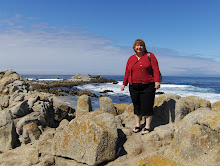
This is a fun book. Not a heavy read - perfect for a fast weekend pickup.
Dead Until Dark is the first in the Southern Vampire Series and is of the horror/romance/mystery genre (if there is such a thing.)
The story takes place in Bon Temps, LA in a time after vampires have newly become a legal minority. It explains that they are actually victims of a virus and with the creation of artificial blood, they no longer are a danger to society. Some vampires begin "mainstreaming" and others are just nasty folks.
Sookie Stackhouse, a barmaid had "been waiting for the vampire for years when he walked into the bar," couldn't wait to meet her first vampire, but they didn't show up in her small town until Bill moved back to the family homestead with hope to find a home. Sookie, the storyteller in this book, has a "disability" of her own - she can read minds. She considers it a handicap and tries to keep it blocked at all times - this takes a lot of effort and people see her as different and even slow. In every other way, Sookie is average -though quite naive, a little sassy, very proper, and surprisingly brave. She is immediately taken by Bill because she can't read his mind - think about it, do you really want to know what the person you are kissing is thinking?
Shortly after Bill makes his appearance in Sookie's life, an old high school acquaintance dies. Then a coworker. Both of these women were "fang-bangers" or vampire groupies. Sookie tries to solve the murders because she's afraid Bill will be blamed. Though he's not off the hook, he earns some respect as he agrees to speak before the Daughters of the Glorious War and tell them what the Civil War was really like. The police attention quickly turns to Sookie's brother - quite the male slut - as it is uncovered that's he's been involved with both women. The murders continue and a vigilante group begins to form. Sookie tries opening herself up to others thoughts in order to solve the murder.
The sex scenes are a little odd, but not too graphic. Her meetings with the head vampire are definitely a little bloody, but nothing too horrific. The addition of a shape-shifter was unnecessary, but a little funny.
The best part of the book - by far - is the depictions of small town America. Harris completely captures small-town life - gossip, attitudes toward outsiders, generosity, and taking care of your neighbors. I will definitely be picking up #2 in the Southern Vampire Series.
Dead Until Dark is the first in the Southern Vampire Series and is of the horror/romance/mystery genre (if there is such a thing.)
The story takes place in Bon Temps, LA in a time after vampires have newly become a legal minority. It explains that they are actually victims of a virus and with the creation of artificial blood, they no longer are a danger to society. Some vampires begin "mainstreaming" and others are just nasty folks.
Sookie Stackhouse, a barmaid had "been waiting for the vampire for years when he walked into the bar," couldn't wait to meet her first vampire, but they didn't show up in her small town until Bill moved back to the family homestead with hope to find a home. Sookie, the storyteller in this book, has a "disability" of her own - she can read minds. She considers it a handicap and tries to keep it blocked at all times - this takes a lot of effort and people see her as different and even slow. In every other way, Sookie is average -though quite naive, a little sassy, very proper, and surprisingly brave. She is immediately taken by Bill because she can't read his mind - think about it, do you really want to know what the person you are kissing is thinking?
Shortly after Bill makes his appearance in Sookie's life, an old high school acquaintance dies. Then a coworker. Both of these women were "fang-bangers" or vampire groupies. Sookie tries to solve the murders because she's afraid Bill will be blamed. Though he's not off the hook, he earns some respect as he agrees to speak before the Daughters of the Glorious War and tell them what the Civil War was really like. The police attention quickly turns to Sookie's brother - quite the male slut - as it is uncovered that's he's been involved with both women. The murders continue and a vigilante group begins to form. Sookie tries opening herself up to others thoughts in order to solve the murder.
The sex scenes are a little odd, but not too graphic. Her meetings with the head vampire are definitely a little bloody, but nothing too horrific. The addition of a shape-shifter was unnecessary, but a little funny.
The best part of the book - by far - is the depictions of small town America. Harris completely captures small-town life - gossip, attitudes toward outsiders, generosity, and taking care of your neighbors. I will definitely be picking up #2 in the Southern Vampire Series.




